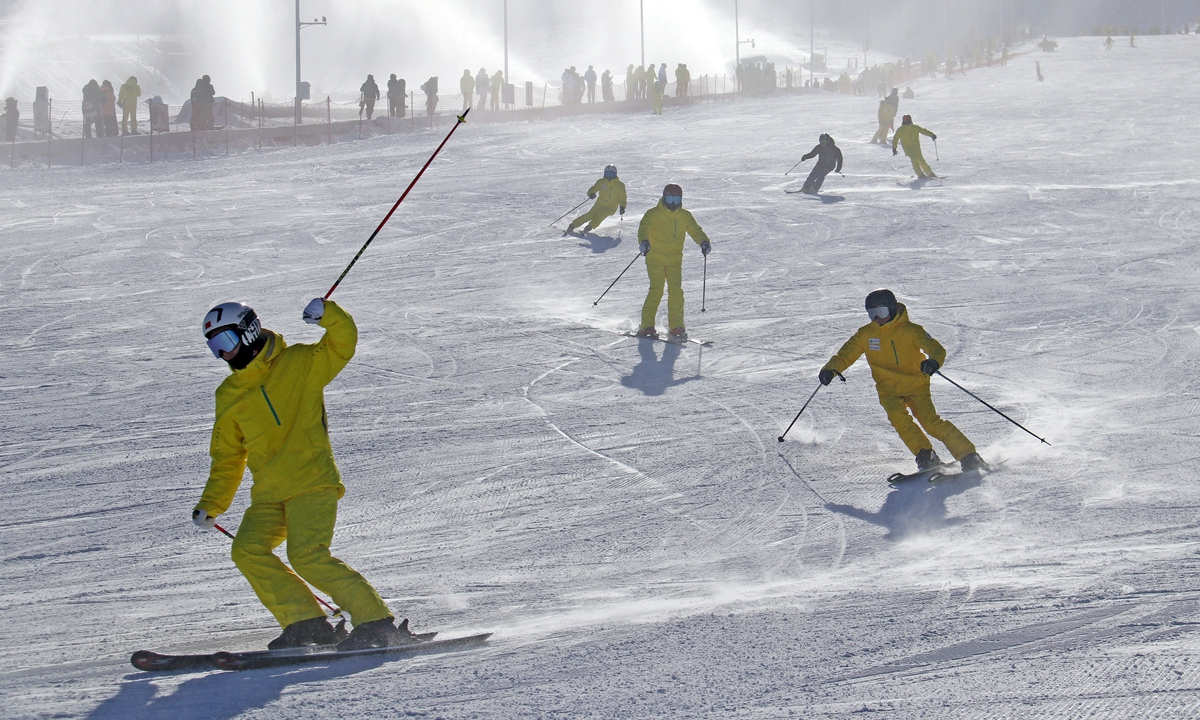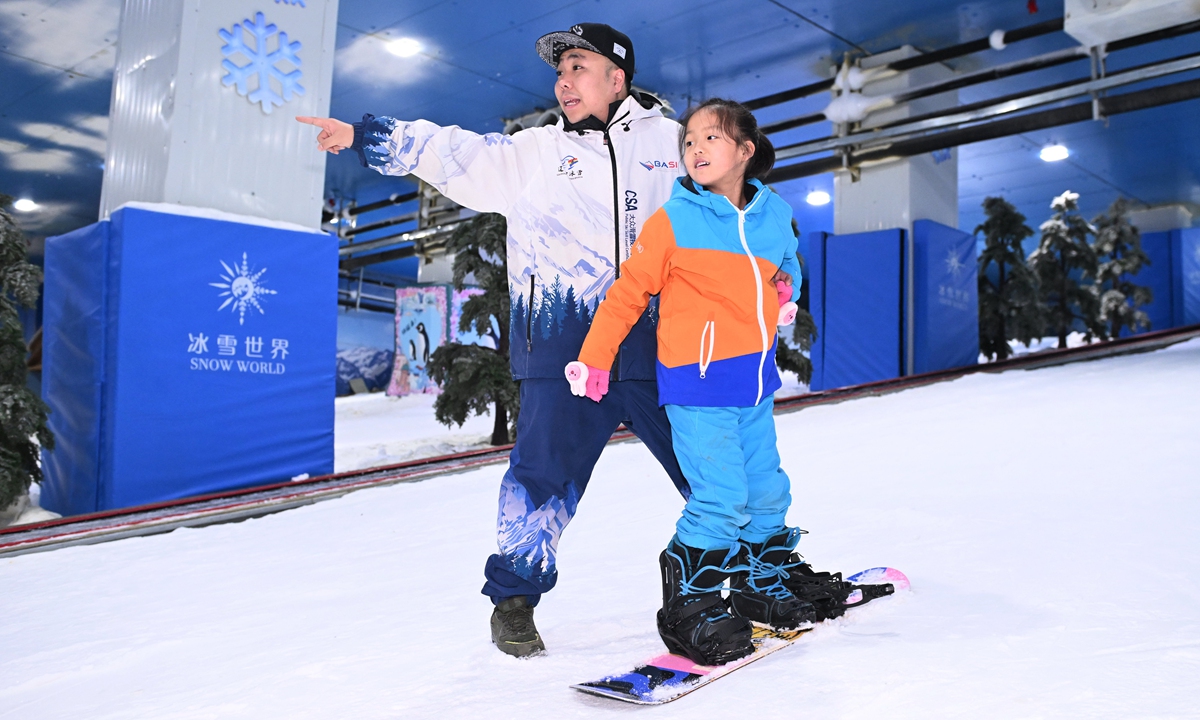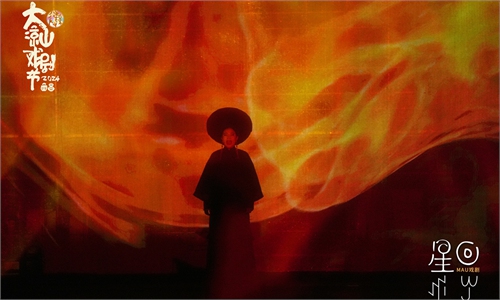ARTS / CULTURE & LEISURE
Rising popularity of skiing calls for better education, coaches
Building path to excellence

People ski at a ski resort in the Altay Prefecture, Northwest China's Xinjiang Uygur Autonomous Region, on November 16, 2024. Photo: VCG
The falling winter temperatures in Northern China may send shivers down anyone's spine, but also ignite the passion of skiers flocking to resorts to embrace the thrill of the slopes, even though the snow conditions of the early winter season are not ideal.
For Beijing local Sun Huigen, who regularly travels to Chongli - a county known for its ski resorts in Beijing's neighboring Hebei Province - to hone his ski skills, kicking off the ski season early has many benefits.
"Kicking off the ski season early allows skiers to avoid the peak crowds of the mid-to-late season," Sun told the Global Times. "For beginners and those eager to improve their skills, an early start offers a longer season to practice and refine techniques."
According to the latest White Paper on China's Ski Industry which was unveiled earlier in November, Chinese people's fervor for the sport continues unabated after the Beijing 2022 Winter Olympics.
Ski resorts across the country recorded a staggering 23.08 million visits in the 2023-24 season, surpassing the number of the Winter Olympics-invigorated 2022-23 season.
Complementing this growth, the State Council, China's cabinet, issued guidelines earlier this month, emphasizing the need to leverage high-quality ice and snow sports to invigorate the winter economy, positioning it as a new driver of economic growth.
Despite the growing number of participants and venues, the development of skiing expertise in China has lagged behind, industry insiders told the Global Times, as a systemic gap in skiing education and training may undermine the long-term sustainability of this burgeoning winter sport culture.
Need for improvement
The average ski learner's journey in skiing is often met by a brief, rushed introduction to the sport, Sun noted, recalling his friends who have learned to ski in recent years.
After taking a quick "crash course" from ski instructors - sometimes lasting no more than two hours - these beginners are left to navigate the slopes on their own.
"The result is often a mix of exhilaration, frustration, and potential injury," Sun told the Global Times. "Over half of them did not really enjoy the glamour of skiing."
Unlike countries with a deep-rooted skiing culture - such as Switzerland, Austria, or Canada - China only established a national framework that guides ski instruction in February 2024 .
In the established markets, skiers benefit from step-by-step courses, certifications, and a pipeline for development that starts with basic techniques and progresses toward advanced training.
Chen Kaiwen, a seasoned Beijing-based ski instructor, told the Global Times that most Chinese ski participants were treating skiing as a recreational activity rather than a sport due to the lack of a systematic education on skiing.
"The novices lack access to a structured learning system that could help them progress from novice level to skilled level," he told the Global Times.
"The absence of a clear pathway for advancement has left many skiers in limbo, unable to transit from occasional hobbyists to proficient skiers."
Another pressing issue is the uneven quality of ski instructors.

A girl learns snowboarding under the guidance of a coach in Shenyang, Northeast China's Liaoning Province, on November 16, 2024. Photo: VCG
While many ski resorts employ coaches, their skills and teaching methods can vary widely, creating inconsistencies in the foundational training that beginners receive.Poor instruction at the start can have long-term consequences, as it sets skiers on a shaky path and hinders their confidence and technique, said Shan Zhaojian, a longtime promoter of skiing who was a national cross-country skiing champion in 1957.
"China's skiing education still lacks standardized teaching materials and a unified system," he told the Global Times in a recent interview. "This gap presents a major obstacle to advancing skiing skills nationwide."
Shan, now in his 80s, still practices alpine skiing if he has free time, which has been an inspiration for many in picking up the skis. But he noted that many young generation skiers often misunderstand ski progress as skiing faster.
"Many of our young skiers are picking up techniques and movements very quickly, which is a positive sign, as they are not afraid of hardship and possess a strong sense of courage. However, there is a general lack of deep understanding and awareness of skiing knowledge," Shan said.
"The true excellence lies in mastering proper techniques and adapting to different speeds and terrains. These are the qualities that define a great skier and what a good ski instructor should strive to achieve."
International cooperation
Hoping to address the domestic ski instructor issues, Chen is seeking for cooperation with ski instructors' organizations such as the Professional Ski Instructors of Europe (PSIE) and the Professional Ski Instructors of Canada to establish a ski coaching system in China.
China is currently enjoying observer status at the International Ski Instructors Association (ISIA) rather than a member state as it in the process of aligning the domestic ski instructor training systems and certifications with ISIA standards, according to Chen.
Jamie Kagan, a senior ski instructor with the PSIE, told the Global Times that he is optimistic about China's ski instructor development.
"There are some really strong skiers here whose knowledge and understanding of skiing is really high. The next step for them is learning how to educate others," Kagan told the Global Times after having a brief stint last week in Chongli to meet with Chinese ski instructors.
"What's really inspiring is the amount of passion that the Chinese community has for ski. That's the really positive place to be if you want to set something up like this."
He suggested that Chinese ski instructors work together, rather than learning individually, as it could lead to more innovation in future instruction practices.
"When you work individually all the time, it's very difficult to innovate and develop yourself as a trainer," Kagan said. "When the coaches collaborate more, they can learn from each other and get innovative and better ideas for ski instructions."
In Chen's vision, a comprehensive system for developing ski instructors is key to fostering a thriving ski industry.
"A comprehensive ski coaching system that all instructors follow will ensure that every coach serves as a model of excellence," Chen explained. "This will enable the country to nurture more skilled and passionate ski enthusiasts."



